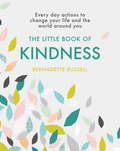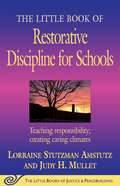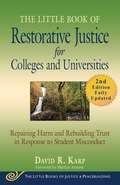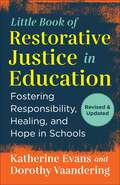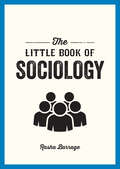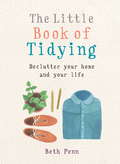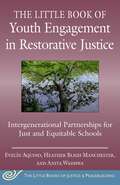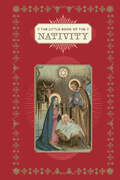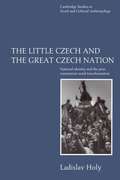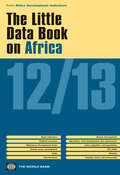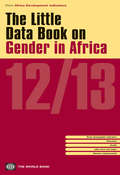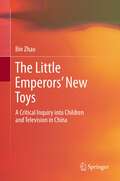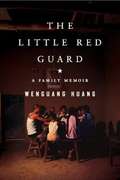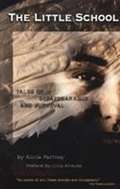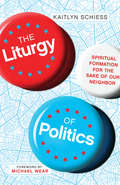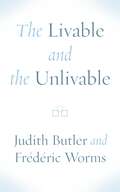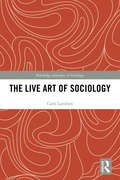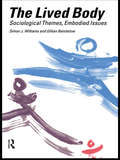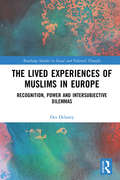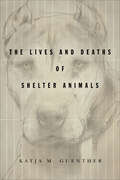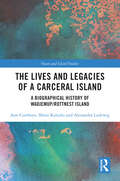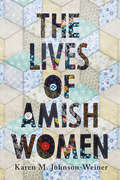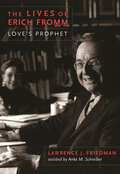- Table View
- List View
The Little Book of Kindness: Everyday actions to change your life and the world around you
by Bernadette RussellThe Little Book of Kindness will teach you how to be kind to yourself, to strangers, to those you love, to the world - every day, at every opportunity. Prompted by the seeming hopelessness of the world around her, Bernadette Russell undertook a pledge to be kind to a stranger every day for a year. The experience left her wanting to inspire others. The Little Book of Kindness is packed with fun ideas, practical tips and interactive exercises that encourage you to 'be kind' in every area of life - online, to strangers, to the environment, in your community, to yourself - and change the world, one act of kindness at a time.
The Little Book of Restorative Discipline for Schools: Teaching Responsibility; Creating Caring Climates (Justice and Peacebuilding)
by Lorraine Stutzman AmstutzCan community-building begin in a classroom? The authors of this book believe that by applying restorative justice at school, we can build a healthier and more just society. With practical applications and models.Can an overworked teacher possibly turn an unruly incident with students into an "opportunity for learning, growth, and community-building"? If restorative justice has been able to salvage lives within the world of criminal behavior, why shouldn't its principles be applied in school classrooms and cafeterias? And if our children learn restorative practices early and daily, won't we be building a healthier, more just society?Two educators answer yes, yes, and yes in this new addition to The Little Books of Justice and Peacebuilding series. Amstutz and Mullet offer applications and models. "Discipline that restores is a process to make things as right as possible." This Little Book shows how to get there.
The Little Book of Restorative Justice for Colleges and Universities, Second Edition: Repairing Harm and Rebuilding Trust in Response to Student Misconduct (Justice and Peacebuilding)
by David R. KarpA Practitioner's Reference and Guide to Implement Restorative Justice on CampusHere’s a call to colleges and universities to consider implementing restorative practices on their campuses, ensuring fair treatment of students and staff while minimizing institutional liability, protecting the campus community, and boosting morale, from an associate dean of student affairs who has put these models to work on his campus.Restorative justice is a collaborative decision-making process that includes victims, offenders, and others who are seeking to hold offenders accountable by having them (a) accept and acknowledge responsibility for their offenses, (b) to the best of their ability, repair the harm they caused to victims and communities, and (c) work to reduce the risk of re-offense by building positive social ties to the community. David Karp writes in his introduction, “As a student affairs administrator, I have become deeply committed to the concept and practice of restorative justice. I have experienced how it can work given the very real pressures among campus conduct administrators to manage high case loads, ensure fair treatment, minimize institutional liability, protect the campus community, boost morale in a division with high turnover, and help students learn from their mistakes without creating insurmountable obstacles to their future successes.”
The Little Book of Restorative Justice in Education: Fostering Responsibility, Healing, and Hope in Schools (Justice and Peacebuilding)
by Dorothy Vaandering Katherine EvansA fully revised & updated handbook for teachers and administrators on creating just and equitable learning environments for students; building and maintaining healthy relationships; healing harm and transforming conflict.Much more than a response to harm, restorative justice nurtures relational, interconnected school cultures. The wisdom embedded within its principles and practices is being welcomed at a time when exclusionary discipline and zero tolerance policies are recognized as perpetuating student apathy, disproportionality, and the school-to-prison pipeline.Relying on the wisdom of early proponents of restorative justice, the daily experiences of educators, and the authors&’ extensive experience as classroom teachers and researchers, this Little Book guides the growth of restorative justice in education (RJE) into the future. Incorporating activities, stories, and examples throughout the book, three major interconnected and equally important aspects of restorative justice in education are explained and applied: creating just and equitable learning environments; building and maintaining healthy relationships; healing harm and transforming conflict. Chapters include:The Way We Do ThingsA Brief History of Restorative Justice in EducationBeliefs and Values in Restorative Justice in EducationCreating just and Equitable Learning EnvironmentsNurturing Healthy relationshipsRepairing Harm and Transforming ConflictA Tale of Two Schools: Thoughts and SustainabilityThe Little Book of Restorative Justice in Education is a reference that practitioners can turn to repeatedly for clarity and consistency as they implement restorative justice in educational settings.
The Little Book of Sociology: A Pocket Guide to the Study of Society
by Rasha BarrageIf you've always wanted to know how societies function - and why sometimes they don't - this beginner's guide to sociology has got the essential theories and thinkers coveredSociology has almost limitless scope. From the smallest everyday interaction to the impact of vast systemic change, societies are brimming with fascinating phenomena we all want to understand more clearly.There's never been a more important moment to grasp what's going on around us, and this pocket-sized guide offers an engaging introduction to the key sociological concepts and debates. It includes easy-to-follow coverage of: The origins and development of modern sociology and the influence of foundational figures such as Durkheim, Marx and Weber The major sociological schools or perspectives, from functionalism to feminism How sociologists strive to test their theories ethically and carefully by using scientific research methods The key topics in sociology, including inequality, class, crime, gender and race How sociology can help us tackle new challenges and change our societies - and the wider world - for the better Perfect for newcomers, or anyone seeking a concise breakdown of the subject, The Little Book of Sociology takes all the big ideas and makes them crystal clear.
The Little Book of Tidying: Declutter Your Home And Your Life (Mbs Little Book Of... Ser.)
by Beth PennIn this age of mass consumerism, we are "stuffocating"; becoming slaves to our possessions. By freeing ourselves from physical and mental clutter, and better managing our schedules, we can focus on what is truly important and discover more time, space and joy. Grounded in solid science and bursting with invaluable tools, activities and strategies, this little book will empower you to discard what you no longer need, regain control of your surroundings and create a happier and more fulfilling life.
The Little Book of Tidying: Declutter your home and your life (The Little Books)
by Beth PennA beautifully colour-illustrated pocket guide to decluttering your home and life by using specific tools and strategies
The Little Book of Youth Engagement in Restorative Justice: Intergenerational Partnerships for Just and Equitable Schools (Justice and Peacebuilding)
by Anita Wadhwa Evelín Aquino Heather Bligh ManchesterThe purpose of this book is to illuminate a theory of youth engagement in restorative justice that seeks to create systems change for more equitable schools. The authors define youth engagement in restorative justice as partnering with young people most impacted by structural injustice as changemakers in all aspects of restorative practices including community building, healing, and the transformation of institutions. Based on Adam Fletcher&’s version of the Ladder of Youth Engagement, coupled with Barbara Love&’s model of liberatory consciousness and an analysis of youth engagement in Restorative Justice in three different regions—Western Massachusetts, Oakland, and Houston—the authors provide a theoretical contribution: Youth Engagement in Restorative Justice grounded in liberatory consciousness. In this book readers will find:Comparative case studies from different parts of the country of youth led restorative justice programs.An exploration of the cultural and historical context of each region to situate the work. Stories from the authors' own lives that provide context for their interest in the work given their varied racial identities (White, Black, Latinx, South Asian) and upbringing. Literature review of the language of youth engagement vs. youth leadership/youth organizing/youth participation, along with a new definition of youth engagement in restorative justice.Theoretical framing based on Adam Fletcher&’s Ladder of Youth Engagement , which provides a structure for the book.Exploration of how adults must combat adultism both individually and systematically as a prerequisite to doing this work.Student narratives. Applications of the work in the virtual context.
The Little Book of the Nativity
by Dominique FoufelleExplore the history and customs connected to the nativity of Jesus in this collection featuring colorfully illustrated lithographs.The perfect companion for Christmas festivities, this little book explores the rich history surrounding the nativity. Filled with more than seventy-five entries featuring fascinating details behind the story of Jesus’s birth, the crèche, the Magi, the Immaculate Conception, and so much more, these pages illuminate the many ways the first Christmas is celebrated throughout the world. Beautifully illustrated with vibrant lithographs taken from prayer books and missals, The Little Book of the Nativity is a joyful and charming treasure for a family to gather around year after year.
The Little Czech and the Great Czech Nation: National Identity and the Post-Communist Transformation of Society
by Ladislav HolyThe book intends to investigate the specific ways in which Czech cultural meanings and the accompanying nationalist sentiments have affected life under communism, its overthrow, and the political and economic transformation of post-communist society.
The Little Data Book on Africa 2012/2013
by World BankThe Little Data Book on Africa 2012/2013 is a pocket edition of Africa Development Indicators 2012/2013. It contains some 115 key indicators on economics, human development, governance, and partnership and is intended as a quick reference for users of the Africa Development Indicators 2010 book and African Development Indicators Online. The country tables present the latest available data for World Bank member countries in Sub-Saharan Africa, covering about 1,700 indicators from 1961 to 2011. Key themes are : - Basic indicators- Drivers of growth- Participating in growth- Capable states- PartnershipsDesigned to provide all those interested in Africa with quick reference and a reliable set of data to monitor development programs and aid flows in the region, this is an invaluable pocket edition reference tool for analysts and policy makers who want a better understanding of the economic and social developments occurring in Africa. For free access to Africa Development Indicators online, please visit http://data. worldbank. org/data-catalog.
The Little Data Book on Gender in Africa 2012/13
by World BankThe Little Data Book on Gender in Africa 2012/13 provides a summary collection of gender statistics on Africa available in one volume. It contains 60 indicators, covering 53 African countries. Additional data may be found on the companion CD-ROM or online, covering about 1,700 indicators from 1961 to 2011. Key themes are : - Basic demographic indicators- Education- Health- Labor force and wages- Women's empowermentDesigned to provide all those interested in Africa with quick reference and a reliable set of data to monitor development programs and aid flows in the region, this is an invaluable pocket edition reference tool for analysts and policy makers who want a better understanding of the economic and social developments occurring in Africa. For free access to Africa Development Indicators online, please visit http://data. worldbank. org/data-catalog.
The Little Emperors’ New Toys
by Bin ZhaoDrawing on original research I conducted in the late 1980s, the book argues for a critical approach to the study of children and television. It begins with critical reappraisals of previous empiricist and interpretative studies to set the ground for a different theoretical inquiry which links biography with history. The situated activity of children's television viewing therefore has to be related to the broader historical and cultural formations in post-Mao China. By way of a methodological pluralism of questionnaire survey, in-depth interviews and observation, the book provides the reader with a thorough critical analysis of the rise of the new commercial ethic in Chinese society in general, and in the sector of media and communications in particular, at the very historical turning point of the late 1980s. Soon after that, Deng Xiaoping made his significant tour to south China, reckoning a big step forward towards further liberalization and started to form a brave new world in China ever since.
The Little Red Guard: A Family Memoir
by Wenguang HuangA Washington Post Best of 2012 pickThree generations of a family living under one roof reflect the dramatic transformations of an entire society in this memoir of life in 20th century ChinaWhen Wenguang Huang was nine years old, his grandmother became obsessed with her own death. Fearing cremation, she extracted from her family the promise to bury her after she died. This was in Xi’an, a city in central China, in the 1970s, when a national ban on all traditional Chinese practices, including burials, was strictly enforced. But Huang’s grandmother was persistent, and two years later, his father built her a coffin. He also appointed his older son, Wenguang, as coffin keeper, a distinction that meant, among other things, sleeping next to the coffin at night.Over the next fifteen years, the whole family was consumed with planning Grandma’s burial, a regular source of friction and contention, with the constant risk of being caught by the authorities. Many years after her death, the family’s memories of her coffin still loom large. Huang, now living and working in America, has come to realize how much the concern over the coffin has affected his upbringing and shaped the lives of everyone in the family. Lyrical and poignant, funny and heartrending, The Little Red Guard is the powerful tale of an ordinary family finding their way through turbulence and transition.
The Little School: Tales of Disappearance and Survival
by Alicia PartnoyEach chapter of this book is introduced by a picture of a blindfolded woman, her hands barely lifting the flap of her kerchief. To prevent prisoners from communicating with and knowing each other, and more importantly, their captors, inmates are kept blindfolded at all times in the "Little School" which is a grim euphemism for the prison camp where the disappeared are tortured and await their fates. These gauze blindfolds are continually slipping, and the pris¬oners are required to summon the guard on duty to tighten them on pain of being beaten or worse if the blindfold is dis¬covered to be loose. Each chapter of this book is introduced by a picture of a blindfolded woman, her hands barely lifting the flap of her kerchief. To prevent prisoners from communicating with and knowing each other, and more importantly, their captors, inmates are kept blindfolded at all times in the "Little School" which is a grim euphemism for the prison camp where the disappeared are tortured and await their fates. These gauze blindfolds are continually slipping, and the prisoners are required to summon the guard on duty to tighten them on pain of being beaten or worse if the blindfold is discovered to be loose. Alicia Partnoy spent more than three months in the Little School before she was transferred to a state prison, where she stayed for more than two years. The readers of her fictionalized account can be thankful that she learned to peep, glimpse, see, and, because such seeing involves the imagination, to envision the veiled world around her. What is amazing, given the brutal and terrifying nature of that world, is that Partnoy could notice the details of its grace and durability. From the true heart of darkness come these tales, recorded in twenty epiphanies of sight and insight.
The Liturgy of Politics: Spiritual Formation for the Sake of Our Neighbor
by Kaitlyn SchiessA generation of young Christians are weary of the political legacy they've inherited and hungry for a better approach. They're tired of seeing their faith tied to political battles they didn't start, and they're frustrated by the failures of leaders they thought they could trust. Kaitlyn Schiess grew up in this landscape, and understands it from the inside. Spiritual formation, and particularly a focus on formative practices, are experiencing a renaissance in Christian thinking—but these ideas are not often applied to the political sphere. In The Liturgy of Politics, Schiess shows that the church's politics are shaped by its habits and practices even when it's unaware of them. Schiess insists that the way out of our political morass is first to recognize the formative power of the political forces all around us, and then to recover historic Christian practices that shape us according to the truth of the gospel.
The Livable and the Unlivable
by Judith Butler Frédéric WormsThe unlivable is the most extreme point of human suffering and injustice. But what is it exactly? How do we define the unlivable? And what can we do to prevent and repair it? These are the intriguing questions Judith Butler and Frédéric Worms discuss in a captivating dialogue situated at the crossroads of contemporary life and politics. Here, Judith Butler criticizes the norms that make life precarious and unlivable, while Frédéric Worms appeals to a “critical vitalism” as a way of allowing the hardship of the unlivable to reveal what is vital for us.For both Butler and Worms, the difference between the livable and the unlivable forms the critical foundation for a contemporary practice of care. Care and support, in all their aspects, make human life livable, that is, “more than living.” To understand it, we must draw on the concrete practices of humans who are confronted with the unlivable: the refugees of today and the witnesses and survivors of past violations and genocide. They teach us what is intolerable but also undeniable about the unlivable, and what we can do to resist it. Crafted with critical rigor, mutual respect, and lively humor, the compelling dialogue transcribed and translated in this book took place at the École Normale Supérieure (ENS) on April 11, 2018, at a time when close to two thousand migrants were living in nearby makeshift camps in northern Paris. The Livable and the Unlivable showcases this 2018 dialogue in the context of Butler’s and Worms’s ongoing work and the evolution of their thought, as presented by Laure Barillas and Arto Charpentier in their equally engaging introduction. It concludes with a new afterword that addresses the crises unfolding in our world and the ways a philosophically rigorous account of life must confront them.While this book will be of keen interest to readers of philosophy and cultural criticism, and those interested in vitalism, new materialism, and critical theory, it is a far from merely academic text. In the conversation between Butler and Worms, we encounter questions we all grapple with in confronting the distress and precarity of our times, marked as it is by types of survival that are unlivable, from concentration camps to prisons to environmental toxicity, to forcible displacement, to the Covid pandemic.The Livable and the Unlivable at once considers longstanding philosophical questions around why and how we live, while working to retrieve a philosophy of life for today’s Left.
The Live Art of Sociology (Routledge Advances in Sociology)
by Cath LambertThe Live Art of Sociology attends to the importance of ‘the live’ in contemporary social and political life. Taking existing work in live sociology as a starting point, this book considers some of its aspirations through unique empirical investigations. Queer and feminist theory and methods are also employed in exploring the challenges of researching live experiences and temporalities. With case study examples ranging from the work of live body artists to experiments in curating sociological research, Lambert successfully demonstrates the diverse ways in which art can provide the aesthetic and affective conditions for social and political disruption. By emphasising the political importance of how people, knowledges, materials, emotions and senses are configured and reconfigured, The Live Art of Sociology asserts a creative and vital role for sociology in not only representing but also generating social realities and political possibilities. Putting aesthetics at the heart of contemporary sociology and making a strong case for a renewed sociological aesthetics, this volume will appeal to undergraduate and postgraduate students as well as postdoctoral researchers and academics interested in fields such as Sociology, Cultural Studies, Art and Visual Culture, Gender and Sexuality Studies and Leisure Studies. It will also be of interest to creative practitioners.
The Lived Body: Sociological Themes, Embodied Issues
by Simon J. Williams Gillian A. BendelowThe Lived Body takes a fresh look at the notion of human embodiment and provides an ideal textbook for undergraduates on the growing number of courses on the sociology of the body.The authors propose a new approach - an 'Embodied Sociology' - one which makes embodiment central rather than peripheral. They critically examine the dualist legacies of the past, assessing the ideas of a range of key thinkers, from Marx to Freud, Foucault to Giddens, Deleuze to Guattari and Irigary to Grosz, in terms of the bodily themes and issues they address.They also explore new areas of research, including the 'fate' of embodiment in late modernity, sex, gender, medical technology and the body, the sociology of emotions, pain, sleep and artistic representations of the body.The Lived Body will provide students and researchers in medical sociology, health sciences, cultural studies and philosophy with clear, accessible coverage of the major theories and debates in the sociology of the body and a challenging new way of thinking.
The Lived Experiences of Muslims in Europe: Recognition, Power and Intersubjective Dilemmas (Routledge Studies in Social and Political Thought)
by Des DelaneyThis book unearths new knowledge and challenges existing paradigms in relation to the integration of minority communities. It comprehensively reflects upon the complexity of recognition experiences and integration challenges faced by Muslim individuals and groups in Europe. By focusing on universal recognition themes related to experiences within personal relationships, legal relations, religion and civil society, it makes an essential contribution to a deeper understanding of Muslim life in the West.It offers a reconsideration of everyday lives of Muslims in Europe by drawing on the paradigm of recognition. Exploring universal themes, it demonstrates the complexity of recognitive relations by examining how Muslim individuals perceive the ways they are recognised, or misrecognised, within various spheres of everyday interaction. It sheds light on the ways in which forms of recognition affect identity formation and social relations more generally, and the broader ramifications that arise from such forms of misrecognition. This book draws on Honneth’s critical social theory of recognition to frame a range of grassroots interviews and focused discussion groups. Grounded in qualitative research and with an emancipatory intent, The Lived Experiences of Muslims in Europe challenges both the assumption that minority groups simply seek to have their particular culture and associated beliefs endorsed by a majority, and the security paradigm that narrowly views Muslims in Europe through the lens of political extremism.
The Lives and Deaths of Shelter Animals: The Lives and Deaths of Shelter Animals
by Katja M. GuentherMonster is an adult pit bull, muscular and grey, who is impounded in a large animal shelter in Los Angeles. Like many other dogs at the shelter, Monster is associated with marginalized humans and assumed to embody certain behaviors because of his breed. And like approximately one million shelter animals each year, Monster will be killed. The Lives and Deaths of Shelter Animals takes us inside one of the country's highest-intake animal shelters. Katja M. Guenther witnesses the dramatic variance in the narratives assigned different animals, including Monster, which dictate their chances for survival. She argues that these inequalities are powerfully linked to human ideas about race, class, gender, ability, and species. Guenther deftly explores internal hierarchies, breed discrimination, and importantly, instances of resistance and agency.
The Lives and Legacies of a Carceral Island: A Biographical History of Wadjemup/Rottnest Island (Ocean and Island Studies)
by Ann Curthoys Shino Konishi Alexandra LudewigThis book is a biographical history of Rottnest Island, a small carceral island offshore from Western Australia. Rottnest is also known as Wadjemup, or ‘the place across the water where the spirits are’, by Noongar, the Indigenous people of south-western Australia. Through a series of biographical case studies of the diverse individuals connected to the island, the book argues that their particular histories lend Rottnest Island a unique heritage, in which Indigenous, maritime, imperial, colonial, penal, and military histories intersect with histories of leisure and recreation. Tracing the way in which Wadjemup/Rottnest Island has been continually re-imagined and re-purposed throughout its history, the text explores the island’s carceral history, which has left behind it a painful community memory. Today it is best known as a beach holiday destination, a reputation bolstered by the ‘Quokka selfie’ trend, the online posting of photographs taken with the island’s cute native marsupial. This book will appeal to academic readers with an interest in Australian history, Aboriginal history, and the history of the British Empire, especially those interested in the burgeoning scholarship on the concept of ‘carceral archipelagos’ and island prisons.
The Lives of Amish Women (Young Center Books in Anabaptist and Pietist Studies)
by Karen M. Johnson-WeinerPresenting a challenge to popular stereotypes, this book is an intimate exploration of the religiously defined roles of Amish women and how these roles have changed over time.Continuity and change, tradition and dynamism shape the lives of Amish women and make their experiences both distinctive and diverse. On the one hand, a principled commitment to living Old Order lives, purposely out of step with the cultural mainstream, has provided Amish women with a good deal of constancy. Even in relatively more progressive Amish communities, women still engage in activities common to their counterparts in earlier times: gardening, homemaking, and childrearing. On the other hand, these persistent themes of domestic labor and the responsibilities of motherhood have been affected by profound social, economic, and technological changes up through the twenty-first century, shaping Amish women's lives in different ways and resulting in increasingly varied experiences.In The Lives of Amish Women, Karen M. Johnson-Weiner draws on her thirty-five years of fieldwork in Amish communities and her correspondence with Amish women to consider how the religiously defined roles of Amish women have changed as Amish churches have evolved. Looking in particular at women's lives and activities at different ages and in different communities, Johnson-Weiner explores the relationship between changing patterns of social and economic interaction with mainstream society and women's family, community, and church roles. What does it mean, Johnson-Weiner asks, for an Amish woman to be humble when she is the owner of a business that serves people internationally? Is a childless Amish woman or a single Amish woman still a "Keeper at Home" in the same way as a woman raising a family? What does Gelassenheit—giving oneself up to God's will—mean in a subsistence-level agrarian Amish community, and is it at all comparable to what it means in a wealthy settlement where some members may be millionaires?Illuminating the key role Amish women play in maintaining the spiritual and economic health of their church communities, this wide-ranging book touches on a number of topics, including early Anabaptist women and Amish pioneers to North America; stages of life; marriage and family; events that bring women together; women as breadwinners; women who do not meet the Amish norm (single women, childless women, widows); and even what books Amish women are reading. Aimed at anyone who is interested in the Amish experience, The Lives of Amish Women will help readers understand better the costs and benefits of being an Amish woman in a modern world and will challenge the stereotypes, myths, and imaginative fictions about Amish women that have shaped how they are viewed by mainstream society.
The Lives of Erich Fromm: Love's Prophet
by Lawrence J. Friedman Anke M. SchreiberThis &“brilliantly comprehensive study&” explores the influential thinker&’s contributions to psychology, philosophy and more—&“academic biography at its best&” (Kirkus, starred review). Erich Fromm was a political activist, psychologist, psychoanalyst, philosopher, and one of the most important intellectuals of the twentieth century. Known for his theories of personality and political insight, Fromm dissected the sadomasochistic appeal of populist dictators. He eloquently championing the virtues of love rooted in joyful contact with others and humanity at large. Admired all over the world, Fromm continues to inspire with his message of universal brotherhood. In the first systematic study of Fromm's influences and achievements, Lawrence J. Friedman revisits the thinker's most important works, including Escape from Freedom and The Art of Loving. He also recounts Fromm's political activism as a founder of Amnesty International, the National Committee for a Sane Nuclear Policy, and other peace groups. Friedman also reveals Fromm's support for anti-Stalinist democratic movements in Central and Eastern Europe and his efforts to revitalize American democracy. Friedman elucidates Fromm's key intellectual contributions, especially his innovative concept of "social character," in which social institutions and practices shape the inner psyche, and he clarifies Fromm's conception of love as an acquired skill. Taking full stock of the thinker's historical and global accomplishments, Friedman portrays a man of immense authenticity and spirituality who made life in the twentieth century more humane than it might have been.
The Lives of Erich Fromm: Love's Prophet
by Lawrence FriedmanErich Fromm was a political activist, psychologist, psychoanalyst, philosopher, and one of the most important intellectuals of the twentieth century. Known for his theories of personality and political insight, Fromm dissected the sadomasochistic appeal of brutal dictators while also eloquently championing love—which, he insisted, was nothing if it did not involve joyful contact with others and humanity at large. Admired all over the world, Fromm continues to inspire with his message of universal brotherhood and quest for lasting peace.The first systematic study of Fromm's influences and achievements, this biography revisits the thinker's most important works, especially Escape from Freedom and The Art of Loving, which conveyed important and complex ideas to millions of readers. The volume recounts Fromm's political activism as a founder and major funder of Amnesty International, the National Committee for a Sane Nuclear Policy, and other peace groups. Consulting rare archival materials across the globe, Lawrence J. Friedman reveals Fromm's support for anti-Stalinist democratic movements in Central and Eastern Europe and his efforts to revitalize American democracy. For the first time, readers learn about Fromm's direct contact with high officials in the American government on matters of war and peace while accessing a deeper understanding of his conceptual differences with Freud, his rapport with Neo-Freudians like Karen Horney and Harry Stack Sullivan, and his association with innovative artists, public intellectuals, and world leaders. Friedman elucidates Fromm's key intellectual contributions, especially his innovative concept of "social character," in which social institutions and practices shape the inner psyche, and he clarifies Fromm's conception of love as an acquired skill. Taking full stock of the thinker's historical and global accomplishments, Friedman portrays a man of immense authenticity and spirituality who made life in the twentieth century more humane than it might have been.
